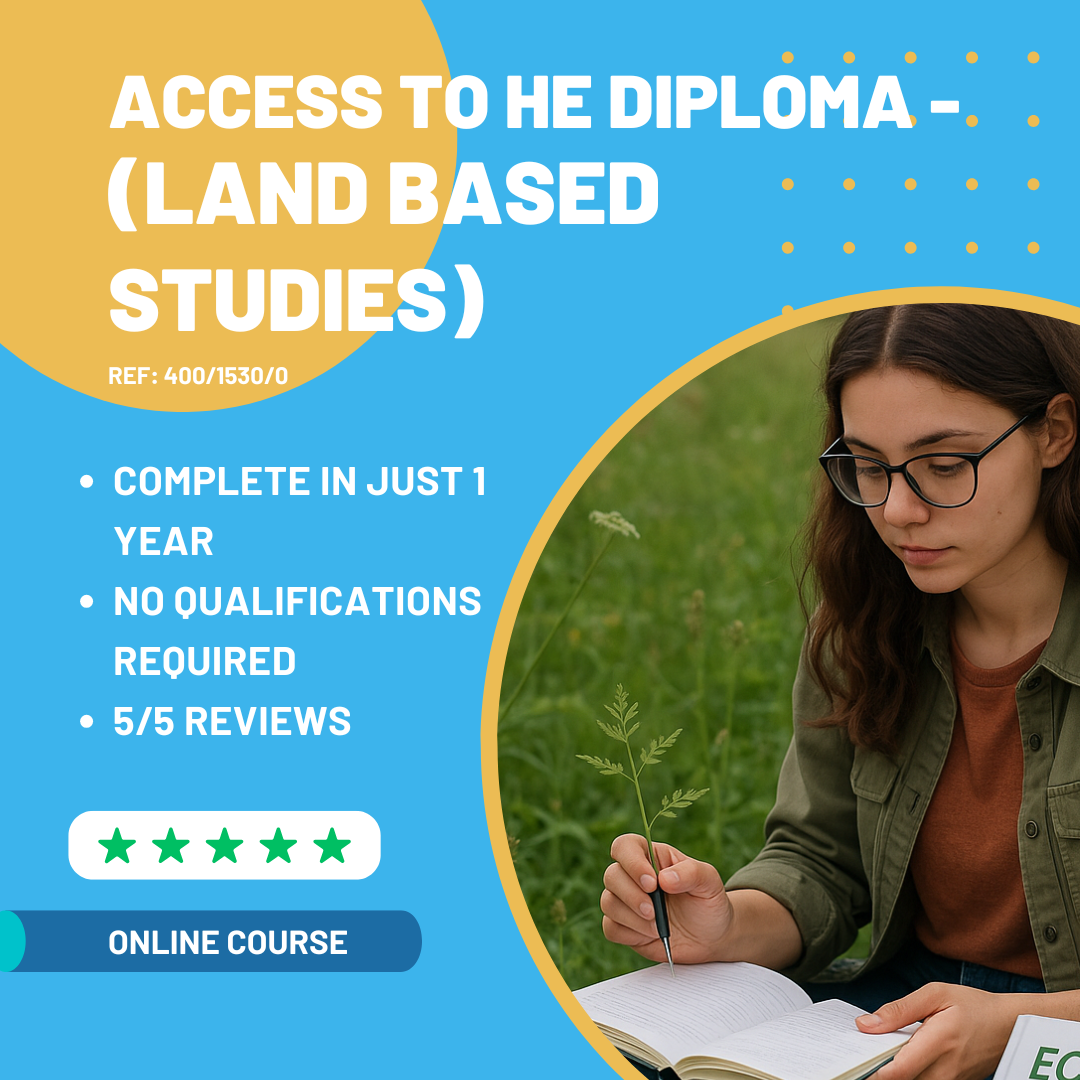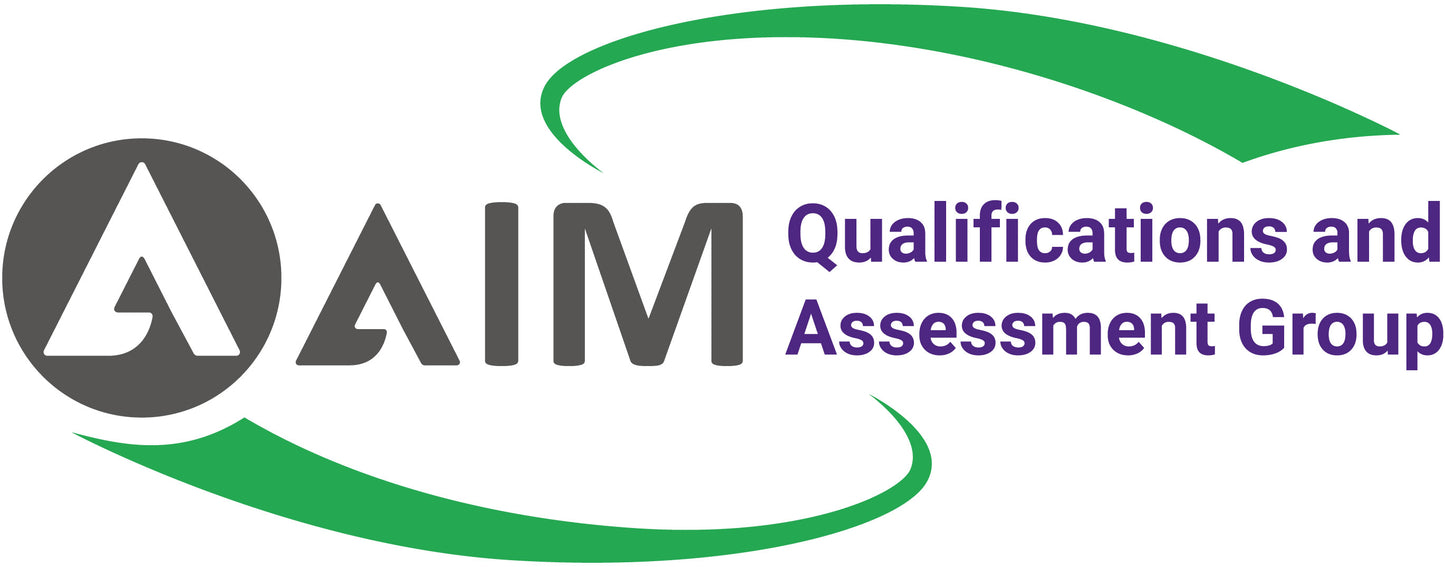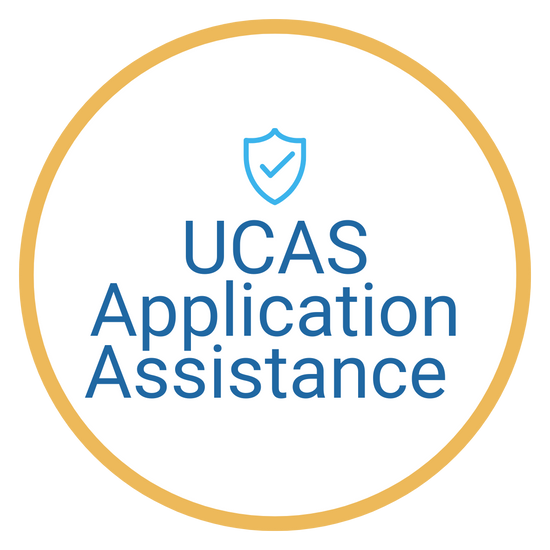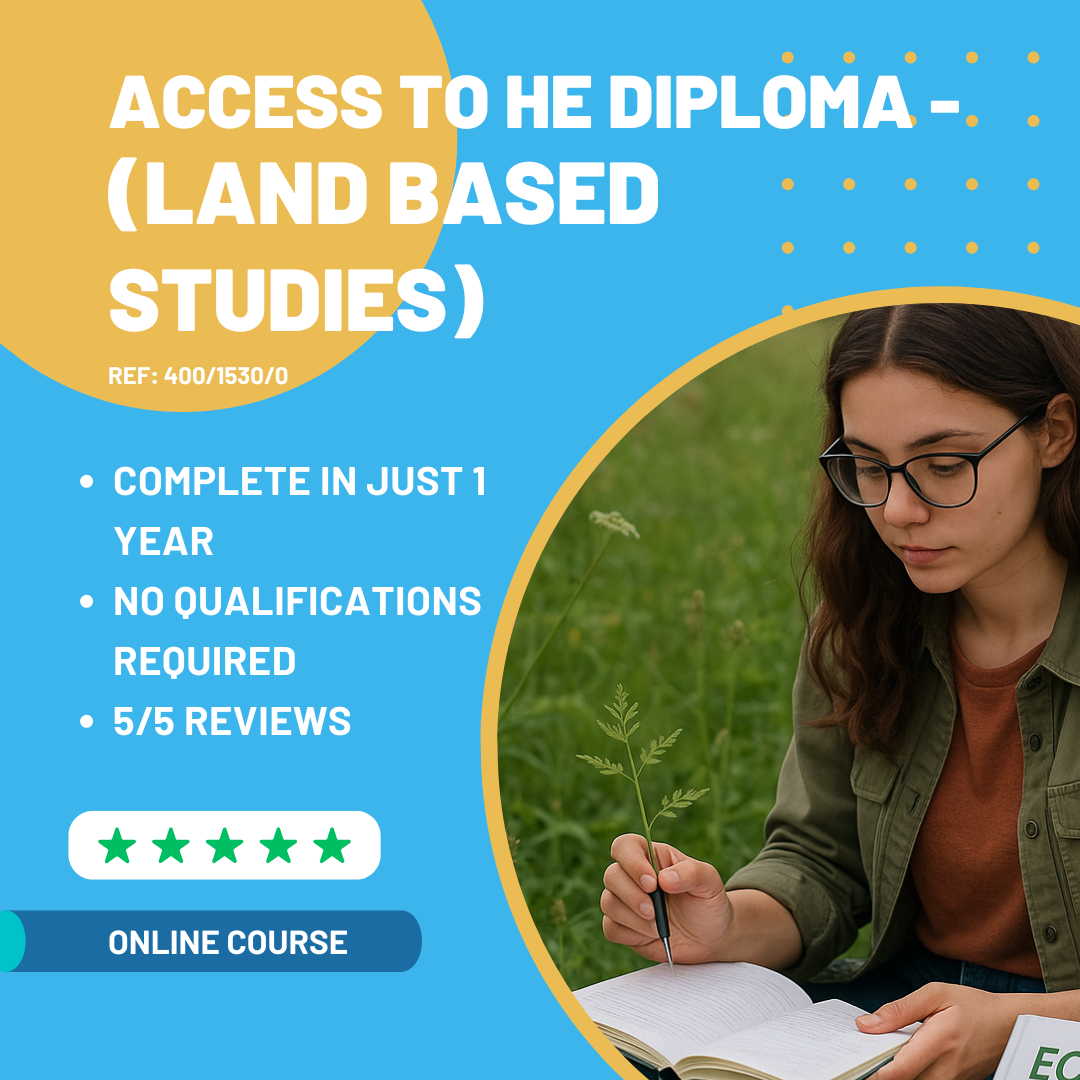AccessCoursesOnline
Access to HE Diploma (Land Based Studies)
Access to HE Diploma (Land Based Studies)
Couldn't load pickup availability
Course Outline
Course Outline
The Access to Higher Education Diploma is a nationally recognised Level 3 qualification regulated by AIM Qualifications and Assessment Group and accepted by UK universities.
The course has been carefully designed to prepare you for the demands of university study. You’ll not only gain subject-specific knowledge in environmental and biological sciences, but also the academic and personal skills that make the transition to higher education smooth and successful.
By the end of the diploma, you will have:
A strong academic foundation in environmental, animal, and plant sciences.
Practical insight into sustainability, conservation, and food production.
The ability to plan, research, and write at university level.
The confidence to progress to higher education in a land-based subject.
Modules
Modules
Academic Study Techniques (6 credits)
This unit equips you with the core skills needed for academic success. You’ll learn how to plan and structure assignments, take effective notes, reference sources correctly, and develop strong writing and revision strategies. The focus is on building confidence and independence so you can meet the demands of university-level study.
Progressing to Higher Education (3 credits)
Here you’ll prepare for the transition into higher education. The unit covers UCAS applications, personal statements, interviews, and what to expect at university. You’ll also reflect on your own goals and identify the qualities needed to succeed in higher education.
Develop Critical Thinking (3 credits)
Critical thinking is central to higher education and professional life. This unit develops your ability to evaluate arguments, identify assumptions, analyse evidence, and construct logical conclusions. You’ll practise questioning ideas and forming reasoned judgements.
An Introduction to Ecology (3 credits)
This unit introduces the principles of ecology, including habitats, ecosystems, populations, and the interrelationships between organisms and their environment. You’ll gain a foundation in ecological thinking that supports progression to more advanced environmental studies.
Conservation (3 credits)
Learn about the importance of conserving species, habitats, and ecosystems. This unit covers conservation strategies, the role of organisations in managing biodiversity, and the impact of human activity on natural environments.
Ecology, Ecosystems & Environmental Management (3 credits)
Explore how ecosystems function and how they can be sustainably managed. Topics include energy flow, nutrient cycles, ecological succession, and methods of environmental management to balance human needs with ecological health.
Environmental Issues (6 credits)
This unit examines pressing environmental problems such as climate change, deforestation, waste management, and water pollution. You’ll analyse causes, consequences, and potential solutions, developing the ability to evaluate environmental policies and global initiatives.
Conservation and Sustainable Development (6 credits)
Understand how conservation links to sustainable development. You’ll explore strategies for balancing economic growth with environmental protection and social wellbeing, with case studies on local, national, and global projects.
Plants in Environmental Design (3 credits)
Discover how plants are used in urban and rural design to improve spaces and ecosystems. This unit looks at the aesthetic, environmental, and social roles of plants in landscape architecture, garden design, and green infrastructure.
Statistical Techniques (3 credits)
Learn to collect, analyse, and interpret numerical data using a range of statistical methods. You’ll gain practical skills in presenting data clearly and drawing valid conclusions—skills essential for research in science and environmental fields.
Research Topic (6 credits)
Undertake your own independent research project on a subject of interest within land-based studies. You’ll plan, carry out, and present your findings, developing advanced skills in research design, data analysis, and academic writing.
Biochemistry (3 credits)
Explore the chemical processes that underpin life. Topics include the structure and function of biological molecules, enzymology, metabolism, and biochemical pathways. This knowledge is essential for understanding both plant and animal biology.
Plant Biology (3 credits)
Examine the structure, physiology, and adaptations of plants. You’ll study processes such as photosynthesis, respiration, and reproduction, alongside the role of plants in ecosystems and agriculture.
Food Production (3 credits)
Investigate the science and methods of food production. The unit covers crop growth, livestock management, sustainable farming practices, and the challenges of feeding a growing global population.
Aspects of Animal Biology (3 credits)
Study the anatomy, physiology, and adaptations of animals. This unit provides an introduction to the biological principles that underpin animal health, welfare, and management.
The Evolution of Multicellular Animals (3 credits)
Trace the evolution of animals from simple organisms to the diverse forms seen today. The unit explores major evolutionary transitions, adaptation, and the diversity of animal life.
Enrolment Requirements
Enrolment Requirements
Enrolment Requirements
There are no formal entry requirements for this course. However, to ensure you can succeed, learners are normally expected to be working at:
Level 2 in English
Level 1 in Mathematics
At Access Courses Online, we’ll provide you with advice and guidance before you enrol, making sure the course is the right fit for you and that you have the motivation and commitment needed to achieve your goals.
Assessments
Assessments
The diploma is assessed through coursework assignments rather than traditional exams. This allows you to demonstrate your knowledge and skills in a practical and supportive way.
To successfully complete the qualification, you must achieve 60 credits in total:
45 graded credits at Level 3 (graded pass, merit, or distinction).
15 ungraded credits at Level 2 or Level 3 (study skills and progression).
Assessment methods may include:
Essays and written reports
Research projects
Presentations
Data analysis tasks
Reflective pieces
Your tutor will provide feedback on each assignment, helping you to improve as you progress. Final grades are confirmed by an Examination Board and externally moderated to ensure fairness and quality.
Qualification
Qualification
On successful completion of this course, you will be awarded a QAA-recognised Access to Higher Education Diploma (Land Based Studies), Level 3 (OFQUAL Ref: 400/1530/0).
This qualification is awarded by AIM Qualifications and Assessment Group, a national awarding organisation regulated by Ofqual, the Quality Assurance Agency for Higher Education (QAA), and Qualifications Wales.
This means your diploma is nationally recognised and accepted by universities across the UK, giving you a trusted and respected pathway into higher education.
Careers
Careers
This diploma can lead to a wide range of degree options, including:
Environmental Science
Agriculture
Ecology
Zoology
Horticulture
Food Production
Animal Science
Geography or Environmental Management
Once you complete your degree, potential career opportunities include:
Environmental Scientist – researching and developing solutions to global environmental issues.
Conservation Officer – protecting wildlife habitats and ensuring biodiversity is preserved.
Ecologist – studying ecosystems and advising on sustainable management.
Zoologist or Animal Scientist – researching animal biology, behaviour, or genetics.
Agricultural Specialist – improving farming methods, food security, and sustainability.
Horticulturist or Landscape Designer – planning and maintaining green spaces for communities.
Food Production Expert – ensuring safe, ethical, and sustainable food supply chains.
Environmental Consultant – working with businesses and governments to reduce environmental impact.
Wildlife Ranger or Park Manager – caring for protected areas and educating the public about conservation.
The land-based sector is dynamic and expanding. By gaining this diploma and progressing onto university, you’ll have the opportunity to build a career that is not only rewarding but also contributes to a sustainable future for our planet.



Our Guarantees
-

Affordable Learning
We offer flexible payment plans to make learning more accessible and affordable. Spread the cost of your course over manageable monthly payments, so you can focus on achieving your goals without financial stress.
-

Application Support
We provide UCAS application support to help you navigate the university admissions process with confidence. From personal statement guidance to application tips, we’re here to support your journey to higher education.
-

Exam Free Learning
Our courses are completely exam free. Instead of exams, you'll complete assignments and coursework designed to develop your knowledge and skills in a supportive and flexible learning environment.
Meet your expert friendly tutor
FAQs
Land Based Studies
What support will I receive?
· One-to-one tutor support.
· Feedback on assignments.
· Guidance on university applications (personal statements, choosing courses).
· Resources and Materials for all tasks. Including expert recorded as well as live lessons and tutorials
How are assessments graded?
· Graded components are usually awarded as Pass, Merit, Distinction.
· Grading is based on the quality of assignments/projects relative to set criteria.
· Ungraded parts (if applicable) contribute to the pass of the diploma but don’t affect the grade classification.
Can I balance this with work / family commitments?
· Our courses are designed with flexibility: part-time options and you set your own deadlines
· Self-paced study.
· Tutors will accommodate learners’ schedules where possible (evening sessions, recorded lectures, etc.).
· Many learners complete this diploma in full time work and/or around family commitments
Are there exams?
No, there are no exams. Assessment is through assignments, projects, practical reports, presentations, fieldwork write-ups, etc.
How long does it take to complete?
Typically, the diploma takes about 9–12 months of study. Depending on whether you.
study full time or part time, and your pace of learning, you can choose to do this diploma in 6 months or up to 24 months.
Tutoring
Who will be my Tutor?
We have professionals that are current in their practice of their chosen fields to support you. For example, you will be able to take directly to a Midwife/Nurse and get guidance and support directly from these professionals as you complete your course.
This is on top of a Faculty Leader in Science who has worked as a Science Teacher for more than 10 years.
Will I get some 1:1 support?
Yes! We help our students personally navigate their career options with online video calls and messenger chats.
We provide 1-1 specialist support to you when you need it.
Working in partnership with you, we will provide a personal service of meeting individual educational needs and career options.
Experience
Do I need to be ‘good’ at science?
You experience of science at school will likely be in an exam-based system that places high importance on being able to remember knowledge and ‘perform’ under exam conditions. This course is completely different, instead of covering vast discipline of science this course focussing on the key foundation knowledge that you’ll need in the next step of your learning journey. Teaching difficult concepts is our expertise, we will meet you where you are and get you where you need to be. By the end of the course, you’ll love science and have produced some useful learning resources to take you into your next stages of study.
I’m anxious about sitting exams, will I have to sit exams either face-to-face or online?
This course is completely online, and you’ll be glad to hear that there are no exams. The course leader will assess your understanding and knowledge of the subject but setting you assessments with clear criteria and assessment descriptors. You will submit your assignment for grading, either ‘pass’, ‘merit’ or ‘distinction’.
I’m nervous to present or talk to the group online, will I be forced to do this?
We will meet you where you are, if you want to develop this skill ready for university then we can arrange smaller group sessions or one-to-one sessions to support you, or you can choose an alternative format for your presentation. We want you to feel comfortable and supported on this course.
University
Will I have support applying for university?
Absolutely, we will hold your hand every step of the way, you can talk to us about course choices, we’ll help proofread your personal statement, provide references. As promised, we will get you to university.
I haven’t decided which exact route I’d like to take within the profession, does it matter?
No, not at all, we’ll introduce you to a number of different professionals within the health services so you can hear about their journey, experience and careers.
Lessons
Will I have to do practical experiments at home?
The investigation skills unit is based around a practical investigation of red peppers. The equipment that you’ll need is limited to things you’d find in your kitchen but you don’t need to carry out the investigation yourself if you don’t want to as your course leader will demonstrate it.
What are the assignments like?
We set a variety of assignments that will set you up with skills that will be useful in your future studying and career. We encourage essay writing with referencing, but don’t worry, we’ll show you how! We also set presentations, video tasks, leaflet and poster design and we show you how to use great free tools like Canva to make it super easy.
Do I have to attend live lessons and switch my camera on?
No, not at all. Many of our students are busy people working shifts and managing several commitments. You can watch the session recordings and then arrange a time to meet with your tutor to ask any questions or get further support. As for the camera, switch it on if you feel comfortable, don’t worry if not. We’ve created a culture of supportive and collaborative students in our online community, but all approaches are respected and accepted. Do what makes you feel comfortable.
Student Review
“I just wanted to take a moment to sincerely thank you for your guidance, patience, and encouragement throughout this course. Your clear explanations and steady support made a real difference. I'm pleased that I achieved a Distinction, and I genuinely believe your teaching played a massive part in that outcome. The effort you put into each lecture, the resources you provided, and the time you gave to help us complete the assignments never went unnoticed. Thank you again for helping me build my understanding and confidence.”






